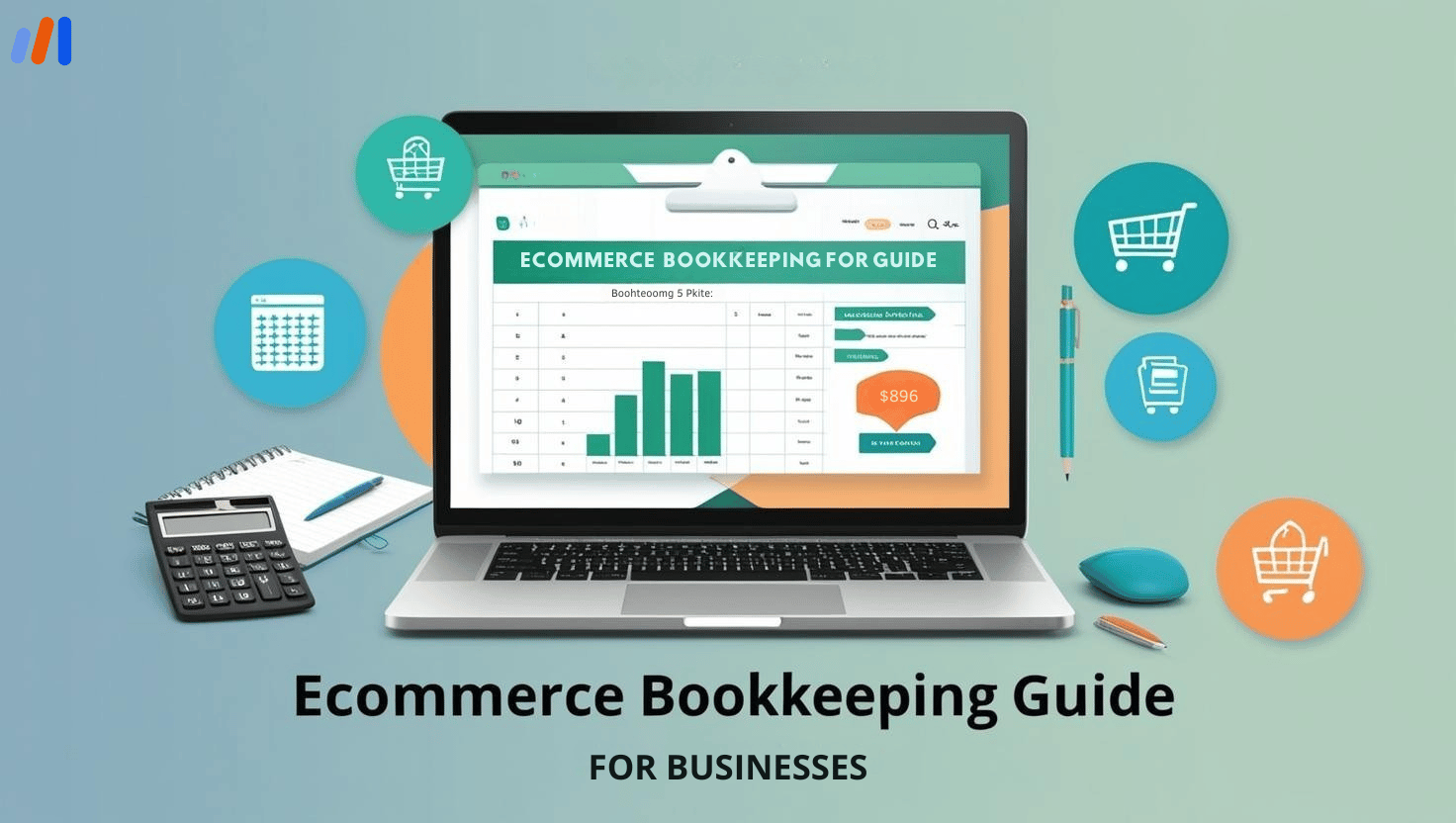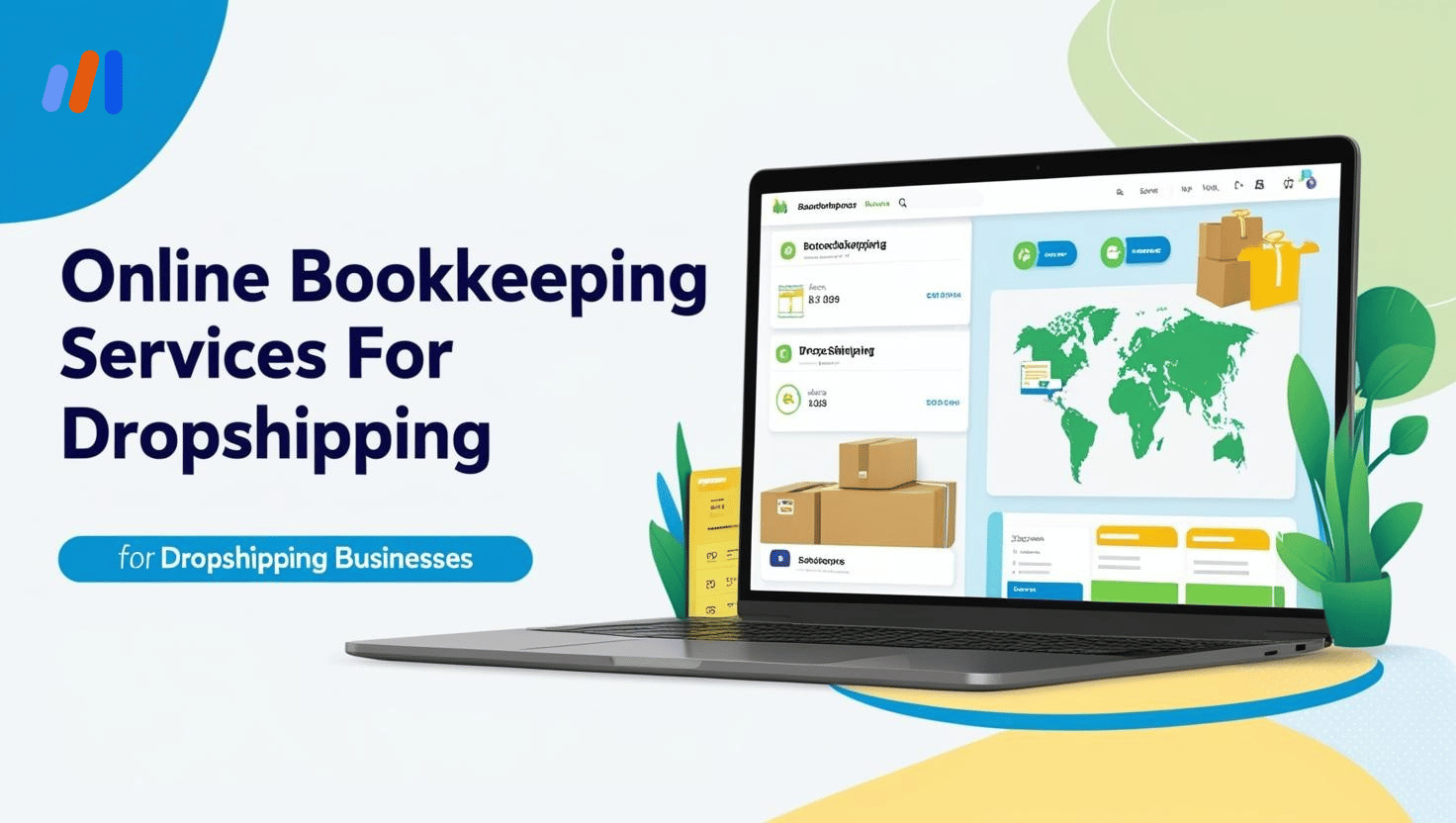Managing an e-commerce business requires careful attention to sales, expenses, taxes, and inventory. These and various other financial transactions often require the attention of an accountant.
E-commerce companies track money differently than traditional brick-and-mortar stores, as these businesses operate on the Internet. This, along with having multiple channels for sales and international clients, makes tracking finances more intricate.
Bookkeeping is essential for keeping businesses in check since it supports financial transparency, mandatory compliance, and business expansion. This is only possible if accurate transaction records are maintained.
Not having an adequate bookkeeping system could lead a business to suffer from scenarios like financial disorder, operational loss, tax issues, and many more, which can create roadblocks for expansion.
This guide covers tools, strategies, and key bookkeeping practices that help streamline the financial operations of e-commerce entrepreneurs and create a blueprint for long-term success.
What is Ecommerce Bookkeeping?
Financial transaction recording and tracking for online businesses is called ecommerce bookkeeping.
This includes managing tax payments, revenue from sales, and expenses like inventory purchases while keeping everything accurate.
Conventional bookkeeping methods won’t cut it today, as e-commerce businesses rely on multiple online sales channels, various payment processors, and regions that may have different taxing structures.
Optimizing cash flow, tax preparations, and overall financial transparency is only possible with accurate e-commerce bookkeeping techniques.
An organized bookkeeping system helps establish an informed decision-making process while allowing for increased profit margin.
Why Bookkeeping is Important for E-commerce Entrepreneurs

To manage finances effectively, bookkeeping is necessary. It helps e-commerce businesses:
- Monitor how much money they are making, spending, and the overall profit to assess their economic condition.
- To have accurate bookkeeping, tax compliance is done which prevents penalties.
- Enhance financial choices through a clear understanding of profits versus losses.
- Effortlessly control cash inflow and outflow to prevent cash problems.
- Stay audit-ready and plan for the future by having accurate financial bookkeeping.
In the absence of efficient bookkeeping, businesses suffer from poor financial management, operational inefficiencies, tax penalties, etc., which can disrupt growth opportunities.
Important Bookkeeping Techniques for E-Commerce Businesses
1. Do Not Mix Personal and Business Accounts
By having a separate business savings account, unnecessary spending is avoided, and reporting taxes gets easier. Consider obtaining a separate business credit card or checking account.
This practice helps in tracking business expenses efficiently and ensures that personal transactions do not interfere with business finances. It also makes tax filing easier and reduces the risk of errors in financial reporting.
2. Understand the Applicable Accounting Method
- Cash Accounting: Transactions are accounted for at the moment cash is either earned or spent. Its benefits include ease and simplicity, which is helpful for a small business that does not have complex financials.
- Accrual Accounting: Its accounting technique where business activities and expenses are recorded when they occur instead of when the payment is completed. This gives a fuller perspective of the finances of the business.
Most companies use the accrual method because, it paints a clearer picture of business finances, enables accurate reporting for taxation, and assists in future financial business dealings.
3. Keep a Detailed Log of all Transactions
For a business to be in good financial standing, it is important to record sales, expenses, and returns accurately. You should consider automating the process of tracking transactions by merging bookkeeping rather than e-commerce tools with Shopify, WooCommerce, or Amazon.
Keeping digital copies of invoices and receipts helps one in complying with tax obligations as well as offering easy-to-reference audit trails for economic activity.
4. Monitor the Cost of Goods Sold (COGS)
It entails all the expenditures incurred directly with the sale of goods which include but are not limited to;
- Cost of goods like raw materials as well as wholesale purchase expenses.
- Shipping and promoting costs which are incurred in sending products to consumers.
- Manufacturing charges if any, comprise labor, and reserve of the production.
Accurately reporting COGS fosters a proper understanding of profit and strengthens pricing policies, operational integrity, and general assessment of the business.
5. Efficient Inventory Management
Businesses risk overselling their products or suffering from stock shortages without a reliable inventory tracking system. Inventory and stock tracking tools must be integrated with the bookkeeping systems in use to ensure stock levels are updated in real-time.
To avoid misstatements, perform regular checks on physical inventory and reconcile them with the records maintained in the documentation.
6. Regular Reconciliation of Bank Statements
Bank statements should be reconciled regularly to ensure that the created records match with the bank transactions. Through this, any existing discrepancies are easily identified along with the errors and possible fraudulent transactions.
Carrying out the reconciliation of statements every month promotes the accuracy of the cash flow as well as prevents the mismanagement of finances.
7. Obligations of Sales Taxes
Managing e-commerce businesses is accompanied by different sales tax challenges when selling products in multiple states or countries. Compliance can be made easier by implementing automated tax software like Avalara or TaxJar.
Keeping abreast of the specific tax laws of different states or regions ensures compliance while also avoiding penalties for failing to meet tax obligations.
8. Monitoring of Cash Flow
The overall financial health of a business comes down to its management of cash flow. Ensuring that there is enough liquidity to facilitate operations and promote growth is the first step.
Owners will be able to prepare for the cash flow needs that arise seasonally or deficit avoiding cash shortages through tracking the cash flow patterns.
9. Automate Keeping Records Through Software
Purchasing bookkeeping software assists in monitoring spending, and income, and reporting finances. They are especially popular with e-commerce businesses:
- EasyBooks: Great for invoicing, expense tracking, keeping records of income, and tax preparations.
- Xero: Great all-in-one accounting solution for businesses based anywhere. Supports multiple currencies and has automated features.
- FreshBooks: Perfect for freelancers and small companies because of its user-friendliness and straightforward invoicing.
- Finaloop: Provides the best experience for e-commerce businesses through simple integrations and real-time insights.
Selecting the appropriate software will vary based on the type of business, volume of transactions, or any of the specific accounting features required.
10. Seek Professional Help
Working with a bookkeeper or accountant who appreciates the nuances of e-commerce will help offer customized feedback and compliance with tax laws.
He or she can assist you with strategizing long-term with the business, analyzing their finances, and tax planning so that profit and efficiency are maximized.
Best Practices to Learn for Managing Bookkeeping for E-Commerce Businesses
Failure to track profits and losses, paying full taxes, or anything else that can cause financial penalties are some common bookkeeping mistakes e-commerce businesses make. This is how to solve your worst fears:
- Lack of basic account reconciliation: Pull and analyze bank statements against each other to find discrepancies that may need resolution.
- Lack of accurate and proper inventory stock tracking: This tactic might result in stock depletion or prematurely realized profits. Using an inventory management disguise.
- Neglecting state taxes: Automate calculations for tax liabilities and calculate the tax laws specific to the state.
- Combining personal and business finances: Maintain separate business accounts to ensure clear financial tracking.
- Neglecting the upkeep of records: Ensure an orderly financial record so that mistakes do not pile up and stress arises during tax season.
How EasyFiling Can Help with E-Commerce Bookkeeping
EasyFiling will take care of all bookkeeping aspects of your e-commerce business such as its accounting needs and legal obligations. We provide support in:
- Automated bookkeeping: Connecting to e-commerce systems for tracking financial activities.
- Tax compliance support: Handling sales tax for many different states.
- Financial reporting: Providing complete reports to assist clients in making important business decisions.
- Expense tracking: Recording business expenditures and preparing financial statements.
- Inventory and COGS management: Keeping track of costs related to the sale of goods to analyze profitability.
With EasyFiling, E-commerce entrepreneurs can concentrate on expanding their business while EasyFiling ensures everything is in order and adheres to the regulations.
Better Methods and Policies For E-Commerce Bookkeeping
- Integrating bookkeeping services with selling platforms will help save time and accuracy.
- Develop a system of accounts for e-commerce businesses that will classify transactions appropriately.
- Analyze financial statements periodically decade by decade to control revenues, expenses, and business profit.
- Maintain electronic copies of invoices, receipts, and tax returns for easy access and reference whenever needed.
- Make allowance for dispatched periods by budgeting adequately and making sure there is enough stock and cash on hand.
Frequently Asked Questions E-commerce Bookkeeping
1. What bookkeeping software for e-commerce businesses is the best?
For e-commerce, EasyBooks, Xero, or Finaloop are the best choices since they are highly used due to their automation and reporting features. The “best” software relies on the requirements and size of your company.
2. When should I reconcile my books?
To ensure all bookkeeping records are accurate, you should reconcile your accounts at least once a month.
3. Are e-commerce businesses obligated to collect sales tax?
As long as you operate in multiple states, yes. E-commerce businesses must collect sales tax starting in the second state they sell in. Automated sales tax software like Avalara or TaxJar will assist in compliance.
4. Why is tracking COGS important for e-commerce?
For e-commerce, tracking COGS is beneficial because it allows e-commerce businesses to access their profitability, set prices that are ideal, and manage stock levels.
5. Can EasyFiling provide bookkeeping services for my e-commerce business?
Of course, EasyFiling could assist e-commerce entrepreneurs and small business owners by offering automated bookkeeping and tax compliance, as well as financial reporting and inventory bookkeeping services.
File Your LLC Today
25$ off with a coupon
Lock in EasyFiling's transparent rates and get lifetime compliance support at no extra cost.
Get Started Now








